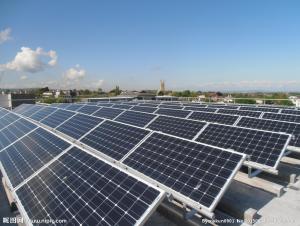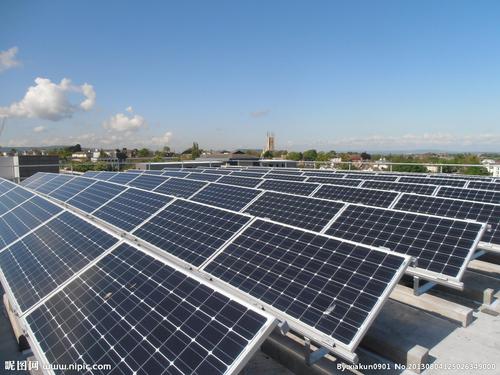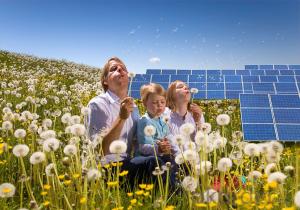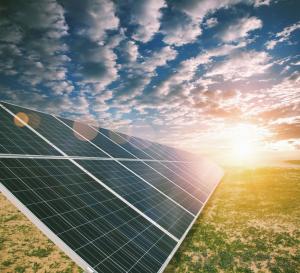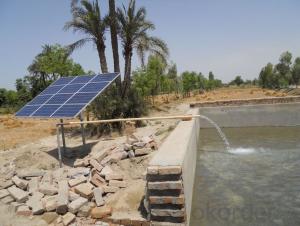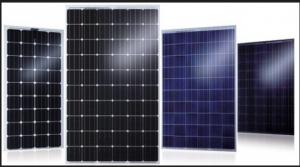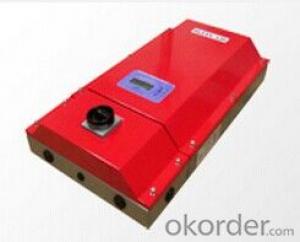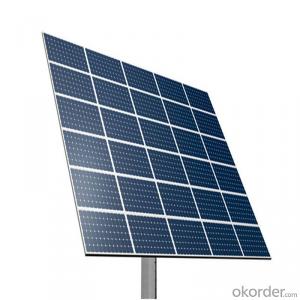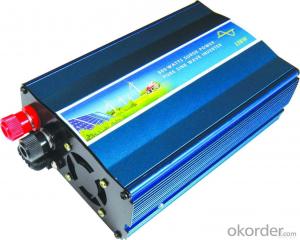Solar Module5 - Solar Panels With Inverters
- Loading Port:
- China Main Port
- Payment Terms:
- TT OR LC
- Min Order Qty:
- -
- Supply Capability:
- -
OKorder Service Pledge
OKorder Financial Service
You Might Also Like
Solar Module
ABOUT YINGLI GREEN ENERGY
Yingli Green Energy Holding Company Limited (NYSE: YGE) is one of
the world’s largest fully vertically integrated PV manufacturers, which
markets its products under the brand “Yingli Solar“. With over 7.0GW
of modules installed globally, we are a leading solar energy company
built upon proven product reliability and sustainable performance. We
are the fi rst renewable energy company and the fi rst Chinese company
to sponsor the FIFA World CupTM.
PERFORMANCE
- High effi ciency, multicrystalline silicon solar cells with high transmission
and textured glass deliver a module effi ciency of up to 16.0%,
minimizing installation costs and maximizing the kWh output of your
system per unit area.
- Tight positive power tolerance of 0W to +5W ensures you receive
modules at or above nameplate power and contributes to minimizing
module mismatch losses leading to improved system yield.
- Top ranking in the “TÜV Rheinland Energy Yield Test” and the
“PHOTON Test” demonstrates high performance and annual energy
production.
RELIABILITY
- Tests by independent laboratories prove that Yingli Solar modules:
Fully conform to certifi cation and regulatory standards.
Withstand wind loads of up to 2.4kPa and snow loads of up to
5.4kPa, confi rming mechanical stability.
Successfully endure ammonia and salt-mist exposure at the highest
severity level, ensuring their performance in adverse conditions.
- Manufacturing facility certifi ed by TÜV Rheinland to ISO 9001:2008,
ISO 14001:2004 and BS OHSAS 18001:2007.
WARRANTIES
- 10-year limited product warranty1.
- Limited power warranty1: 10 years at 91.2% of the minimal rated power
output, 25 years at 80.7% of the minimal rated power output.
1In compliance with our Warranty Terms and Conditions.
QUALIFICATIONS & CERTIFICATES
IEC 61215, IEC 61730, MCS, CE, ISO 9001:2008, ISO 14001:2004, BS OHSAS
18001:2007, PV Cycle, SA 8000
ELECTRICAL PERFORMANCE
Electrical parameters at Standard Test Conditions (STC)
Module type YLxxxP-29b (xxx=Pmax)
Power output Pmax W 260 255 250 245 240
Power output tolerances ΔPmax W 0 / + 5
Module effi ciency ηm % 16.0 15.7 15.4 15.1 14.8
Voltage at Pmax Vmpp V 30.3 30.0 29.8 29.6 29.3
Current at Pmax Impp A 8.59 8.49 8.39 8.28 8.18
Open-circuit voltage Voc V 37.7 37.7 37.6 37.5 37.5
Short-circuit current Isc A 9.09 9.01 8.92 8.83 8.75
Electrical parameters at Nominal Operating Cell Temperature (NOCT)
Power output Pmax W 189.7 186.0 182.4 178.7 175.1
Voltage at Pmax Vmpp V 27.6 27.4 27.2 27.0 26.8
Current at Pmax Impp A 6.87 6.79 6.71 6.62 6.54
Open-circuit voltage Voc V 34.8 34.8 34.7 34.6 34.6
Short-circuit current Isc A 7.35 7.28 7.21 7.14 7.07
STC: 1000W/m2 irradiance, 25°C cell temperature, AM1.5g spectrum according to EN 60904-3.
Average relative effi ciency reduction of 3.3% at 200W/m2 according to EN 60904-1.
NOCT: open-circuit module operation temperature at 800W/m2 irradiance, 20°C ambient temperature, 1m/s wind speed.
OPERATING CONDITIONS
Max. system voltage 1000VDC
Max. series fuse rating 15A
Limiting reverse current 15A
Operating temperature range -40°C to 85°C
Max. static load, front (e.g., snow) 5400Pa
Max. static load, back (e.g., wind) 2400Pa
Max. hailstone impact (diameter / velocity) 25mm / 23m/s
CONSTRUCTION MATERIALS
Front cover (material / thickness) low-iron tempered glass / 3.2mm
Cell (quantity / material / dimensions /
number of busbars)
60 / multicrystalline silicon / 156mm x 156mm / 2 or 3
Encapsulant (material) ethylene vinyl acetate (EVA)
Frame (material / color / anodization color /
edge sealing) anodized aluminum alloy / silver / clear / silicone or tape
Junction box (protection degree) ≥ IP65
Cable (length / cross-sectional area) 1000mm / 4mm2
Plug connector
(type / protection degree) MC4 / IP67 or YT08-1 / IP67 or Amphenol H4 / IP68
PACKAGING SPECIFICATIONS
Number of modules per pallet 29
Number of pallets per 40' container 28
Packaging box dimensions
(L / W / H) 1700mm / 1135mm / 1165mm
Box weight 568kg
Unit: mm
• Due to continuous innovation, research and product improvement, the specifi cations in this product information sheet are subject to change
without prior notice. The specifi cations may deviate slightly and are not guaranteed.
• The data do not refer to a single module and they are not part of the offer, they only serve for comparison to different module types
- Q: This is the cenario. Your yearly energy use comes by mail and it states that the total amount of energy used your household is 7000kWh.Then you make the decision of switching to get solar panels. The question is what area should your solar panel be given that the average annual length of daylight is 2.0.
- It is not that simple. There are 3 main types of solar cells. Monocrystalline silicon is the most efficient and produces the smallest solar cells, and therefore the smallest panels. Poly-crystalline (or multi-crystalline) silicon produces the next most efficient type of cells and are a popular choice. Amorphous (or thin-film) silicon uses the least amount of silicon and also produces the least efficient solar cells. This means thin film system take up more area than the other two; an important factor to consider in relation to possible future upgrades; i.e. if you'll have enough space left to do so. The North (in the Southern hemisphere) or South (in the Northern hemisphere) facing roof collects the most energy. So this biases the roof area required. Your energy usage can be changed. Hot water (a major energy user) could be better using direct solar heating with peak demand boosting, either from mains or solar. There are other possibilities, either to reduce demand or to provide energy from other sources. Not all sunshine hours are equal. Hours around midday are far more productive than hours later in the day. This must be factored in.
- Q: Can solar panels be installed on a rented property?
- Yes, solar panels can be installed on a rented property. However, it is important to consult with the landlord and review the lease agreement to ensure that the installation is allowed. In some cases, the landlord may require written permission or may be responsible for the installation process. Additionally, it is recommended to discuss the potential benefits and cost savings of installing solar panels with the landlord to determine if it is a viable option for both parties.
- Q: I want to be more green and if I get the panels will I still have a regular electric bill?
- There okorder / Why pay thousands of dollars for solar energy ($27,000 average cost) when you can build your own solar panel system for just a fraction of the retail cost. You can build a single solar panel or you can build an entire array of panels to power your whole house. Some people are saving 50% on their power bill, some people are reducing their bill to nothing. But what’s most impressive is that just by following these instructions some are even making the power company pay them!
- Q: How much space is needed to install solar panels?
- The amount of space needed to install solar panels varies depending on factors such as the size of the panels, the efficiency of the system, and the energy requirements of the property. On average, a typical residential solar panel system requires about 100-400 square feet of roof space per kilowatt of installed capacity. However, it's important to consult with a solar installer to determine the specific space requirements for your property.
- Q: Can solar panels be used for powering a farm or agricultural operation?
- Yes, solar panels can definitely be used to power a farm or agricultural operation. Solar energy can be harnessed and converted into electricity to meet various energy needs in the agricultural sector, such as powering irrigation systems, pumps, lighting, and other machinery. By utilizing solar panels, farmers can reduce their reliance on fossil fuels, lower energy costs, and contribute to a more sustainable and environmentally friendly operation.
- Q: Can solar panels be installed on historic buildings?
- Yes, solar panels can be installed on historic buildings. However, the installation process may require careful planning and consideration to ensure that the panels are discreetly integrated with the building's architecture and do not compromise its historical value. In some cases, solar panels may need to be installed in less visible areas or designed to resemble traditional building materials. Additionally, it is important to consult with preservation experts and local authorities to ensure compliance with any regulations or guidelines specific to historic buildings.
- Q: What is the working principle of solar panels?
- the material is easy to industrial production and material performance and stability.
- Q: I am intrested in buying solar panels to save a buck and even maek some money off of it but I was wondering what kind? How Much? How Many? Are they easy to install? Whats the best brand? I want alot of information on this if anyone can give me some help on it in a user friendly way it would be appreciated!
- You're unlikely to 'save a buck' much less 'make any money off of it' at the present state of the art. The panels and equipment will cost more than you'll save in the next ten years. That might change with energy prices, but not enough any time soon.
- Q: Can solar panels be installed on a high-rise building?
- Yes, solar panels can be installed on a high-rise building. In fact, high-rise buildings can be ideal locations for solar panel installation due to their height and large surface areas. By utilizing the available roof space, high-rise buildings can generate significant amounts of solar energy, helping to reduce their reliance on traditional energy sources and lowering their carbon footprint.
- Q: i was reading the popular science magazine and i saw that they might make a Sun Powered it Absolutely NOT possible to make a car with a Solar Panel? I dont see any harm in making it..
- How would a car with Solar Panels work in a city like London, Seattle, or Dublin, where it is cloudy and rainy more often than not? Unless there is a way to store up the solar power, I don't see it working very well.
Send your message to us
Solar Module5 - Solar Panels With Inverters
- Loading Port:
- China Main Port
- Payment Terms:
- TT OR LC
- Min Order Qty:
- -
- Supply Capability:
- -
OKorder Service Pledge
OKorder Financial Service
Similar products
Hot products
Hot Searches
Related keywords
